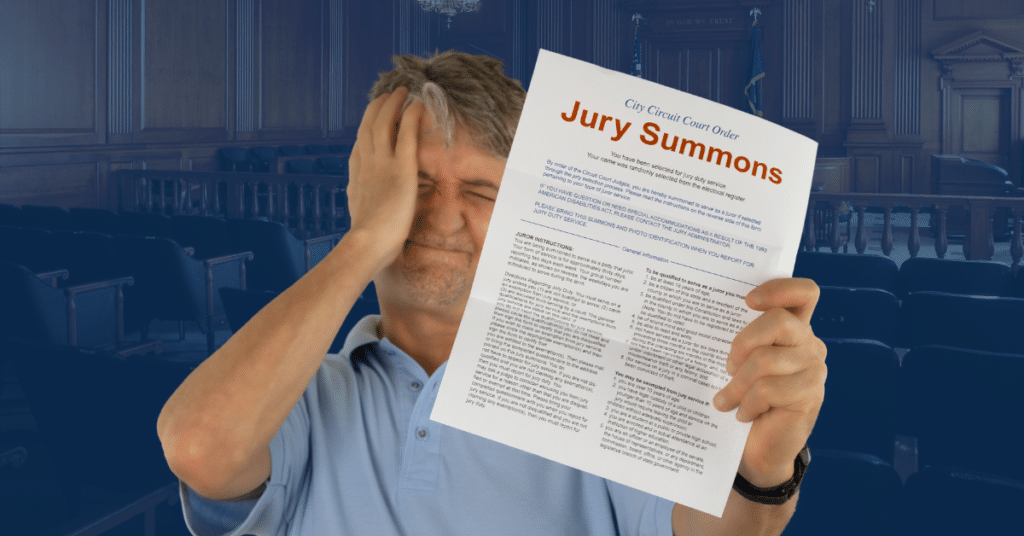
Originally published September 12, 2016
As a U.S. citizen, our right to a jury trial is one of the foundations our country was built upon. Unfortunately, there is usually a negative reaction when people are informed of their obligation to participate in jury duty.
One of the first reactions that someone may have to receiving jury duty summons is to groan, throw it in the trash and act like it never happened. Of course, you can’t disregard the notice, you must show up, or you will face legal repercussions. But it’s important to realize that it isn’t really a “duty.” It is a right we have because of the Constitution. Specifically, the Seventh Amendment to our Constitution reads:
“In Suits at common law, where the value in controversy shall exceed twenty dollars, the right of trial by jury shall be preserved, and no fact tried by a jury, shall be otherwise re-examined in any Court of the United States, than according to the rules of the common law.”
As citizens of this great country, we have the honor and the trust to decide fairly over someone’s case. By fulfilling this civic duty, we carry out the right the Constitution gave us. We must preserve this right by responding when we are summoned to serve.
Who is qualified to sit on a jury in Colorado?
The following qualifications are required for those who can be summoned for jury duty in our state:
• A citizen of the United States
• At least 18 years of age
• Able to read, write, speak, and understand the English language
• Must reside in Colorado and in one of the counties within the jury division in which they are being summoned
Who is disqualified from sitting on a jury in Colorado?
The following are considered disqualifying characteristics of a potential juror:
• Being under the age of 18
• Inability to read, speak, and understand the English language
• Inability, by reason of a physical or mental disability, to render satisfactory juror service.
• Sole responsibility for the daily care of an individual with a permanent disability living in the same household to the extent that the performance of juror service would cause a substantial risk of injury to the health of the individual with a disability.
• Residence outside of the county with no intention of returning to the county at any time during the succeeding twelve months
• Selection and service as an impaneled trial or grand juror in any municipal, tribal, military, state, or federal court within the preceding twelve months or being scheduled for juror service within the next twelve months.
What happens if you fail to report for Jury Duty?
Per the Uniform Jury Selection and Service Act (UJSSA), “The jury commissioner may send a delinquency notice by certified or first-class mail to any trial or grand juror who has failed to appear for juror service. The purposes of delinquency notices shall be only to notify the jurors of their delinquent status and to rectify the problem by appropriate means. The jury commissioner shall have discretionary authority to resolve delinquent juror problems.”
In other words, if you fail to appear in court you will receive a delinquency notice, which simply means you are not in compliance with your summons and notifies the juror of their delinquencies and how to rectify the problem.
Can I be excused from jury duty?
You have the option to apply for your service to be postponed to a later date for many different reasons. Each juror has the right to one postponement of the term of juror service.
Per CRS 13-71-116, “The postponement must not last more than six months, but may extend into the next calendar year. To exercise this right, the juror shall notify the jury commissioner by telephone or in writing requesting an alternate date to which juror service may be postponed. A jury commissioner, in the jury commissioner’s discretion, may set the date to which the juror’s service is postponed. A jury commissioner shall notify the juror by telephone or in writing of the new date.”
The summons that you will receive will have the exact instructions on how to request a postponement of your jury service and the proper ways for you to contact the court.
What happens if I have to miss work?
Per the UJSSA, all regularly employed jurors will be paid regular wages, but not to exceed fifty dollars per day unless by mutual agreement between the employee and employer. Your employer is required to compensate you for your missed time and they will be liable to you if they fail to compensate you for your time at jury duty.
It is extremely important that you inform your employer that you will be on jury duty, and check with your HR department to see what your options are regarding paid time off, or available jury-specific days off.
How to Prepare for Jury Duty
Even if you receive a summons, you may not have to report to jury duty. Your summons should include a phone number or another way to access whether you will have to appear, such as a website. Summons go out weeks before a trial date. Make sure you take the time to properly contact the court if you need to be excused. All trials scheduled for your day may settle before the summons date and no jurors will be required. Depending on the court, you may not know if you will have to appear until the night before.
There will be some time where you will have to wait during the proceedings. Bring a book or something quiet to do so you don’t get bored. Remember, you most likely won’t be able to use your cell phone. Please be courteous while you are there.
Also, be sure to get a good meal and a good night’s sleep before. You’ll have to be there early, and you don’t want to end up sleeping in and missing it. If you get chosen, you’ll want to be at your best. No one likes a sleepy juror.
If you enjoyed this blog, you may be interested in the following:
- Why Trial Lawyers are Good for Business
- What Not to Wear: Courtroom Edition
- Served with a Subpoena? What to do Next.
- Our Top 10 Picks for Legal Movies


